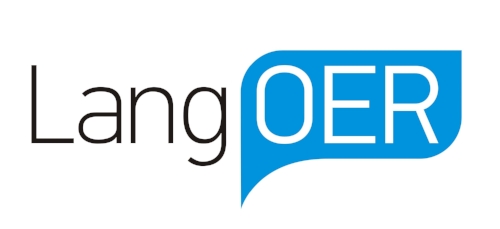Open Educational Resources (OER) – and ICDE
Info note in relation to the LangOER Conference on Open Education: Promoting diversity for European Languages, 26-27 September 2016.
International Council for Open and Distance Education, ICDE, is a partner in the European Union funded project LangOER. In that project ICDE has the role of developing policies and also in knowledge-sharing connecting Europe and Global and vice versa. Now LangOER organises its final conference in Brussels, and this note briefly inform you on ICDE and OER.
ICDE, is a global membership association. Institutions, universities, governmental agencies and governments, associations and networks as well as individual are members. While ICDE organises all levels of education, the focus is on higher education. Open education is a mantra among many ICDE members, for some, in fact already from the 1970's. And many ICDE members engaged early in Open Educational Resources. Why? To promote access to affordable, equitable, inclusive and quality education.
More specific, ICDE strongly support OER because OER has a great potential to:
make educational resources updated and more relevant
lower costs for governments and students
include students and teachers in co-creation and use of educational resources
increase effect of investments in education
stimulate innovation in education
Today ICDE engages in OER in many ways:
Member institutions make significantly use of OER, to the benefit of students, parents of students and the efficiency of education, examples are:
Universities of Maryland University College, the largest public US online education provider, introduced OER as curriculum up to Bachelor level last autumn. http://www.umuc.edu/
The Norwegian National Digital Learning Arena, NDLA is a successful provider of OER for Secondary Schools, serving 200.000 students, most teachers is familiar with and use the OERs. https://ndla.no/
UNISA, the largest university in South Africa, have OER as a core practice for their students. http://www.unisa.ac.za
Support and promote significant OER initiatives like the French initiative for higher education, http://www.sup-numerique.gouv.fr/ developed and cultivated by the French virtual thematic universities.
Other ways ICDE engages are:
Supporting Research and Innovation in OER, appointing ICDE Chairs in OER – most chairs in OER, promoting OER through their research and activities - in all regions of the world - are ICDE Chairs. http://www.icde.org/index.php?option=com_content&view=article&id=505:icde-chairs-in-open-educational-resources---call-for-proposals&catid=35:open-calls&Itemid=170
Hosting the ICDE Global Doctoral Consortium which also supports doctoral studies in OER and Open Education, having partnership and close cooperation with the Global OER Graduate network, GO-GN, http://www.icde.org/gdc and http://go-gn.net
Taking initiatives for making OER sustainable, e.g. through the feasibility study for a Global Open Library for Higher Education in collaboration with the French Virtual Thematic Universities.
Partnership with UNESCO which has the lead for OER as a part of the Education 2030 agenda.
Partnership with other stakeholders, like Commonwealth of Learning, CoL, and Open Education Consortium in initiatives for Open Education and OER. https://www.col.org/ and http://www.oeconsortium.org/
Advocating OER among global NGOs and IGOs.
Participating in concrete projects like LangOER, to promote OER within its contexts, BERTA, bringing (open) educational resources to teachers in Africa, and OPAL, Open Educational Quality Initiative in Europe.
Why does ICDE engage in Lesser Used Languages?
Most countries, most nations, most regions are entities with lesser used languages. In fact, lesser used languages are the majority. And from several major studies we know that education in your native language:
will favour better learning experiences
is stimulating creative capacities among learners
build self-confidence – compared with the alternative
is of a particular importance for education on bachelor level and below, most important for the lower educational levels
What could you and we do more of?
Policy:
Policy is a key to have an OER breakthrough. To have decision makers on a regional, national or institutional level decide on policy is critical for success.
Practice:
Yes, the proof of the pudding is in the eating. To turn a 2000 year olds educational practice (based on that only one hand written book was available) into open is not a quick fix. To vision, set goals for, and implement a collaborative OER practice is crucial for the benefits from OER.
Initiatives:
Many open initiatives exist, where you can join at your own premises. Want to have a global overview? Look at the global OER map. https://oerworldmap.org/
Organise the work:
Several initiatives and organisations for making OER reaching the “tipping point”, to make the break through, to make OER sustainable exist. Take part!
Creative Commons https://creativecommons.org/
Open Education Consortium http://www.oeconsortium.org/
ICDE www.icde.org
And many more are there for you.
Take note of:
UNESCO, the governments collaboration on education, supports your work The European Union, the European Commission and the Committee of Regions, supports your work. A specific partnership initiative for Open Governments exists http://www.opengovpartnership.org/
From commitment to action:
The next World Open Educational Resources (OER) Congress, is underway:
The Commonwealth of Learning (COL) is conducting six Regional Consultations around the world in the lead up to the 2nd World Open Educational Resources (OER) Congress, scheduled to be held in Ljubljana, Slovenia, from 18 to 20 September 2017. The consultations are being held in partnership with UNESCO, Slovenian National Commission for UNESCO and UNESCO Chair on Open Technologies for OER and Open Learning (Jožef Stefan Institute, Slovenia).
The central theme is “OER for Inclusive and Equitable Quality Education: From Commitment to Action”
The schedule:
Is your government or institution an OER advocate?
If not, try to influence!
ICDE Secretary General ICDE







